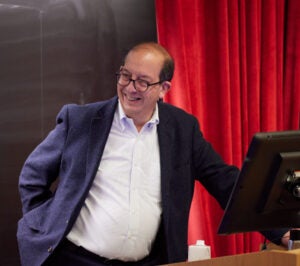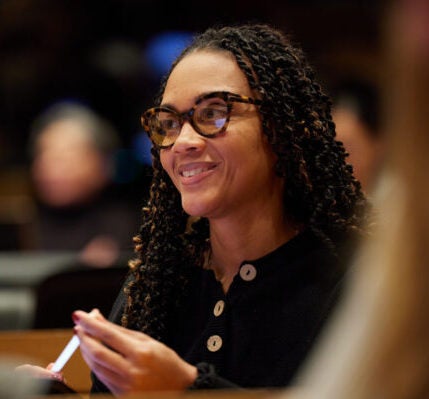In fall 2023, the Center for Health Communication at Harvard Chan School offered a course called SBS 225 | Engaging the Press: A Practical look at Health Communication, taught by former news executive Richard (Dick) Tofel, who co-founded and served as president of ProPublica. We asked student Ouleye Ndoye, who is completing her DrPH degree, what she learned from the course.
Were you excited to take this course?
To tell you the truth, when this course was added to our requirements, I was not happy about it. Prior to taking this class, if you had asked me how to engage with the press, I’d have said, “Don’t!” I did not want to take a course about the press. However, I absolutely loved this class, and it ended up becoming one of my favorites at Harvard Chan School.
What has this course taught you?
It taught me how to engage with reporters, how to approach an interview, and how to prepare everything from my appearance to my words. It also taught me how to look at a media encounter from the perspective of everyone involved, from the reporter to the audience and the agency or organization you represent.
One of the biggest lessons I learned about communicating science to the press and the public is that it’s OK to say that information is still developing, and we don’t have all the answers. During the peak of COVID in 2020, many people pretended they knew what we should do next, when in fact, the science was changing every day. This class gave us time to take a step back, share what each of us saw as the pandemic unfolded across the country, and talk about it with some of the people who were making decisions about how to communicate information at the time.
What lesson surprised you the most?
That you can follow up with a reporter afterward and ask certain questions in advance to prepare. I might have not felt comfortable doing that in the past. I viewed the interview as the time you have with the journalist and that’s it. I learned that it can be an ongoing conversation, and this reduces the pressure of feeling that I must communicate everything perfectly in just one attempt.
How were lessons structured?

Every week guests joined us in class to discuss one of the topics. Sometimes scientists and faculty at the school would join us, like Assistant Professor of Immunology and Infectious Disease, Dr. Kizzmekia S Corbett-Helaire, and Associate Professor of Immunology, Bill Hanage. Other times, we were visited by experts from outside such as reporters and editors, including a former senior editor at the Wall Street Journal, Gabriella Stern, and Torie Bosch, the first opinion editor at STAT. Prof. Tofel interviewed guests in such a masterful way. Watching him, in many ways, was my training. He was able to extract differences in opinion and create a professional, healthy tension in the room, while peeling back the layers to reveal the essence of the matter being discussed and what was truly at stake for each public health topic. We then were able to analyze how it impacted society from various angles. This 360-degree perspective was one of the gifts this class gave me.
He would also encourage us to jump in and ask our questions at any time. We were very much part of the discussion and shaping the learning in that room. This is one of the beautiful things about Harvard Chan School – your classmates also have incredible experience, and their insights and perspectives bring a lot to the conversation.
How will this course help you in your career?
Out of all the classes I have taken, this was probably one of the most applicable to my career. The media serves as the conduit for delivering information to the public and understanding how to effectively interact with it is crucial, especially amidst the current prevalence of media misinformation and disinformation. I wish I had all these lessons in my past roles and am grateful to have them now.
Will you do anything differently now?
Yes. Having so many reporters, editors, producers, and coaches come to our class and having the opportunity to ask them questions in a safe space allowed me to envision stepping into future interviews feeling prepared and confident.
I am also more likely to pitch my story ideas to media outlets. This class has clarified the process of interacting with the media and made the prospect of publishing op-eds seem achievable. If you believe it, you can achieve it!




